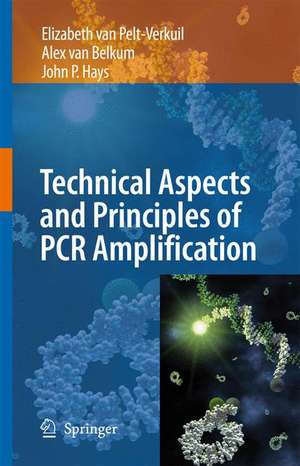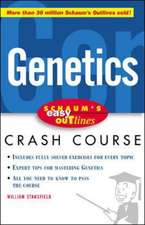Principles and Technical Aspects of PCR Amplification
Autor Elizabeth van Pelt-Verkuil, Alex van Belkum, John P. Haysen Limba Engleză Hardback – 28 mar 2008
Frequently, PCR technicians and specialists limit their understanding of PCR to one particular methodology. However, this approach limits their appreciation of the range of versatile PCR techniques currently available, techniques that may be applicable and indeed more suitable to their own laboratory situation.
This manual aims to provide thereader with a guide to the standard PCR technique and its many available modifications, with particular emphasis on the role of PCR techniques in the diagnostic laboratory (the central theme of this manual). Further, many important technical issues have been addressed, including types of PCR template material, PCR optimization, the analysis of PCR products, quality control and quality assurance, variants and adaptations of the standard PCR protocol, quantitative PCR and in situ PCR. The reader of this manual will be excellently informed about the fundamental principles of PCR and the true potential of PCR within clinical laboratory practice.
| Toate formatele și edițiile | Preț | Express |
|---|---|---|
| Paperback (1) | 940.39 lei 6-8 săpt. | |
| SPRINGER NETHERLANDS – 19 oct 2010 | 940.39 lei 6-8 săpt. | |
| Hardback (1) | 954.45 lei 6-8 săpt. | |
| SPRINGER NETHERLANDS – 28 mar 2008 | 954.45 lei 6-8 săpt. |
Preț: 954.45 lei
Preț vechi: 1163.97 lei
-18% Nou
Puncte Express: 1432
Preț estimativ în valută:
182.65€ • 189.61$ • 152.30£
182.65€ • 189.61$ • 152.30£
Carte tipărită la comandă
Livrare economică 24 martie-07 aprilie
Preluare comenzi: 021 569.72.76
Specificații
ISBN-13: 9781402062407
ISBN-10: 1402062400
Pagini: 250
Ilustrații: XII, 330 p.
Dimensiuni: 155 x 235 x 26 mm
Greutate: 0.7 kg
Ediția:2008
Editura: SPRINGER NETHERLANDS
Colecția Springer
Locul publicării:Dordrecht, Netherlands
ISBN-10: 1402062400
Pagini: 250
Ilustrații: XII, 330 p.
Dimensiuni: 155 x 235 x 26 mm
Greutate: 0.7 kg
Ediția:2008
Editura: SPRINGER NETHERLANDS
Colecția Springer
Locul publicării:Dordrecht, Netherlands
Public țintă
ResearchCuprins
The Polymerase Chain Reaction.- A Brief Comparison Between In Vivo DNA Replication and In Vitro PCR Amplification.- The PCR in Practice.- The Different Types and Varieties of Nucleic Acid Target Molecules.- PCR Primers.- Deoxynucleotide Triphosphates and Buffer Components.- Taq and Other Thermostable DNA Polymerases.- Important Considerations for Typical, Quantitative and Real-Time PCR Protocols.- Analysis of PCR Amplification Products.- Ensuring PCR Quality – Laboratory Organisation, PCR Optimization and Controls.- Ensuring PCR Quality – Quality Criteria and Quality Assurance.- Variants and Adaptations of the Standard PCR Protocol.- In Situ PCR Amplification (ISA) – Major Considerations, Sample Processing and Applications.
Textul de pe ultima copertă
Kary Mullis was awarded a Nobel Prize for inventing the PCR technique more than 15 years ago in 1993. Since its "discovery", multiple adaptations and variations of the standard PCR technique have been described, with many of these adaptations and variations currently being used in clinical, diagnostic and academic laboratories across the world. Further, these techniques are being applied at the diagnostic level (e.g. as high throughput testing methodologies to detect minimum residual disease, the presence/absence of specific pathogens etc), as well as to increase our understanding of fundamental disease processes.
Frequently, PCR technicians and specialists limit their understanding of PCR to one particular methodology. However, this approach limits their appreciation of the range of versatile PCR techniques currently available, techniques that may be applicable and indeed more suitable to their own laboratory situation.
This manual aims to provide thereader with a guide to the standard PCR technique and its many available modifications, with particular emphasis on the role of PCR techniques in the diagnostic laboratory (the central theme of this manual). Further, many important technical issues have been addressed, including types of PCR template material, PCR optimization, the analysis of PCR products, quality control and quality assurance, variants and adaptations of the standard PCR protocol, quantitative PCR and in situ PCR. The reader of this manual will be excellently informed about the fundamental principles of PCR and the true potential of PCR within clinical laboratory practice.
Frequently, PCR technicians and specialists limit their understanding of PCR to one particular methodology. However, this approach limits their appreciation of the range of versatile PCR techniques currently available, techniques that may be applicable and indeed more suitable to their own laboratory situation.
This manual aims to provide thereader with a guide to the standard PCR technique and its many available modifications, with particular emphasis on the role of PCR techniques in the diagnostic laboratory (the central theme of this manual). Further, many important technical issues have been addressed, including types of PCR template material, PCR optimization, the analysis of PCR products, quality control and quality assurance, variants and adaptations of the standard PCR protocol, quantitative PCR and in situ PCR. The reader of this manual will be excellently informed about the fundamental principles of PCR and the true potential of PCR within clinical laboratory practice.
Caracteristici
Gives a broad overview of available PCR techniques and variants Focussing on the PCR technique, not restricted to a few limited applications associated with a minor discipline Chapters outlining appropriate quality control procedures are included Written by scientists with a broad knowledge of the field of PCR techniques and PCR-related clinical research















